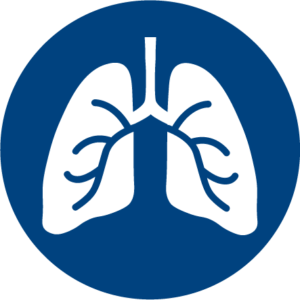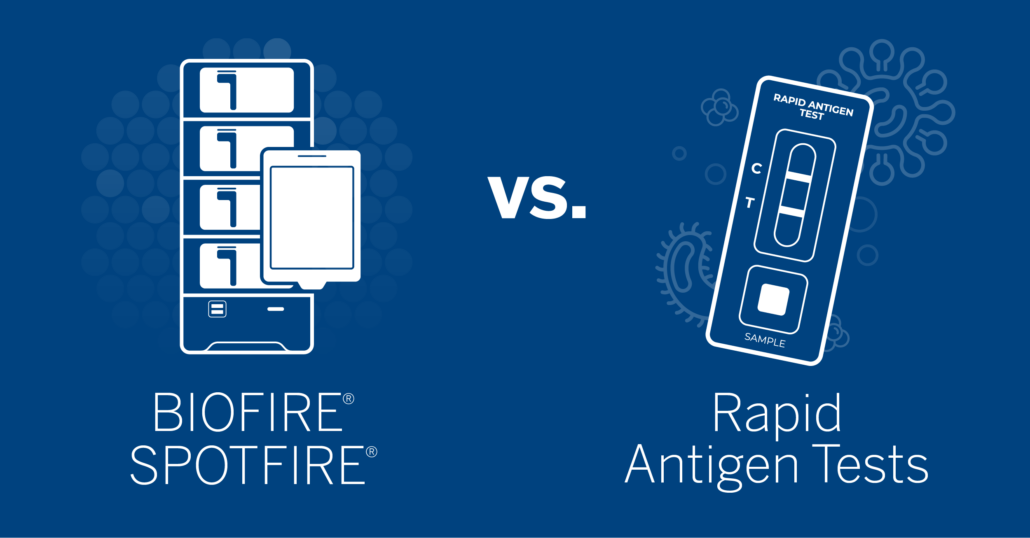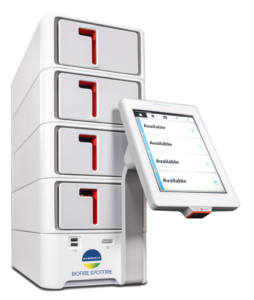There can be no doubt that the world will never be the same after the COVID-19 pandemic. Among many other unprecedented phenomena, the public’s awareness of respiratory diagnostics was one of the pandemic’s most surprising impacts. The terms “PCR” and “antigen test” have become commonplace in day-to-day conversations, with many likely having taken at least one of these tests since March 2020.
Despite the World Health Organization officially ending the public health emergency for COVID-19, the need for COVID-19 and respiratory testing in general is more relevant than ever.1 The novel coronavirus will likely continue to circulate alongside influenza and respiratory syncytial virus (RSV) during respiratory season, adding an additional layer of risk for vulnerable individuals.
However, with the pandemic winding down, testing practices may change. COVID-19 rapid antigen tests, including home tests, were a staple at the height of the pandemic because they gave people—especially those with symptoms—fast answers that informed their need to self-isolate, among other protective measures. But because COVID-19 symptoms overlap with those of seasonal respiratory viruses, molecular testing—in particular, multiplex PCR tests—may be more reliable in getting the right answer, the first time.2
PCR vs. COVID-19 Antigen Testing
Polymerase chain reaction (PCR) is a chemical process that rapidly and exponentially amplifies target nucleic acid. This process can produce millions to billions of copies of a particular segment of DNA or RNA. This enables researchers and laboratorians to take a very small amount of nucleic acid and amplify it into a large enough volume for sequencing, analysis, or experimentation. Traditional PCR testing can take anywhere between 24 hours to a few days to produce a result.
Antigen tests, on the other hand, are much faster, although the speed comes at the cost of sensitivity (true positive rate) and specificity (true negative rate).3 The test works by mixing a sample with a solution containing synthetic antibodies that will bind specific viral proteins if they are present in the sample. The chemical reaction happens on a test strip that will indicate a positive result with a color- or light-based readout.3 Antigen tests typically take 15-30 minutes to produce a result, giving them the appropriate moniker of “rapid test.”
Below is a quick summary for each test.
| Rapid Antigen Test (SARS-CoV-2) | Molecular PCR Test | |
| What it detects | Proteins (i.e., antigens) from the virus | Genetic material (DNA or RNA) from the virus |
| Where it’s performed | At home with a self-test kit or at a point-of-care facility | In a lab |
| Accuracy | Positive results are generally reliable, whereas negative results should be confirmed. Because the test is not as sensitive as a PCR test, it is prone to false-negative results. This does not mean that the virus is not present—just that there may be a low viral load. | This test is considered the gold standard due to its high sensitivity. PCR tests detect the virus even at the start of infection, when the viral load is low, and after the infection has passed. |
| Speed | About 15-30 minutes | 24 hours to a few days |
| When to use | – Symptomatic testing when a fast answer is needed (e.g., before an event or social gathering) | – For accurate diagnosis – Symptomatic testing and asymptomatic screening |
Clearly, the two tests are not created equal. Whereas PCR is regarded as the “gold standard,” the reduced sensitivity of rapid antigen tests has warranted the FDA to recommend follow-up molecular testing in the case of a negative result and likelihood of exposure or presentation of symptoms.4 In fact, the CDC notes that, “In most circumstances, the manufacturers’ instructions for use of antigen tests indicate that negative test results should be considered ‘presumptive’, meaning that they are preliminary results.”5
However, as mentioned above PCR tests have their drawbacks. Some tests can have a turnaround time anywhere between 24 hours to several days. Additionally, such tests are generally designed to detect 1-2 types of viruses, excluding other possible pathogens that cause similar symptoms. Although historically PCR tests can take 24 hours or longer to get results, there are now systems available that can provide results much faster, including the BIOFIRE® Panels from bioMérieux.
Multiplex PCR Testing from bioMérieux
The BIOFIRE® FILMARRAY® TORCH and newly launched BIOFIRE® SPOTFIRE® Respiratory Solution are designed with speed and accuracy in mind. The two systems run multiplex PCR tests, which involves amplifying multiple gene targets in the same test, within a clinically actionable timeframe to support timely and optimal therapy.
The BIOFIRE TORCH runs the BIOFIRE® Respiratory 2.1 (RP2.1) Panel, while the SPOTFIRE runs the BIOFIRE® SPOTFIRE® Respiratory (R) Panel and the BIOFIRE® SPOTFIRE® Respiratory Panel Mini (R Mini). Below is an overview of what each test can deliver.
| BIOFIRE RP2.1 Panel | SPOTFIRE R Panel | SPOTFIRE R Mini | |
| Is it a multiplex PCR test? | Yes | Yes | Yes |
| Number of pathogen targets in one test | 22 | 15 | 5 |
| Does it test for COVID-19, influenza, and RSV? | Yes | Yes | Yes |
| Where is the testing done? | Laboratories and hospitals | Point-of-care facilities | Point-of-care facilities |
| Time to result upon loading pouch | ~45 minutes | ~15 minutes | ~15 minutes |
The Syndromic Approach for Respiratory Diagnostics
The bioMérieux respiratory panels are unique in that they leverage the syndromic approach to respiratory testing. Given that the 2022/23 respiratory season has seen a resurgence of human rhinovirus/enterovirus, parainfluenza viruses, and RSV against the backdrop of COVID-19, having the right answer, the first time is invaluable when patients are desperate for answers.
Getting a differential diagnosis on a respiratory infection can be tricky, however, because symptoms tend to overlap. The PCR systems from bioMérieux can help remove guesswork by combining several possible targets into one quick test. This, coupled with the high sensitivity of PCR, allows the BIOFIRE RP2.1 Panel, SPOTFIRE R Panel, and SPOTFIRE R Panel Mini to help clinicians get diagnostic answers without ordering several separate respiratory tests.
Bottom Line
Testing for COVID-19 will likely remain important even after the pandemic is over, but it should not come at the expense of testing for other respiratory viruses. The focus must shift to ordering multiplex PCR tests on a PCR system, as this process is comparable to rapid antigen tests in speed and has the added benefit of higher sensitivity.
The biggest advantage of a comprehensive respiratory panel, however, is that it can test for not just COVID-19 but other respiratory pathogens that are already making a comeback. The more diagnostic information you have, the better you can navigate a post-pandemic respiratory landscape.
Product availability varies by country. Consult your bioMérieux representative.
Learn More About Respiratory Trends and Syndromic Respiratory Testing from bioMérieux
- 7 Benefits of PCR Testing for Infectious Diseases
- Syndromic Infectious Disease Testing: The New Paradigm
- Check in on the 2022-23 Flu Season
- Respiratory Spread in Schools
- The Value of Syndromic Respiratory Testing in Outpatient Settings
- Discover the Revolutionary SPOTFIRE System and its Potential in the Point-of-care Market
References:
- WHO. Statement on the fifteenth meeting of the IHR (2005) Emergency Committee on the COVID-19 pandemic. Accessed 8 May, 2023. Retrieved from: https://www.who.int/news/item/05-05-2023-statement-on-the-fifteenth-meeting-of-the-international-health-regulations-(2005)-emergency-committee-regarding-the-coronavirus-disease-(covid-19)-pandemic
- Mayo Clinic. COVID-19, cold, allergies and the flu: What are the differences? Accessed 5 May 2023. Retrieved from: https://www.mayoclinic.org/diseases-conditions/coronavirus/in-depth/covid-19-cold-flu-and-allergies-differences/art-20503981
- Johns Hopkins Center for Heath Security. Antigen Tests. Accessed 5 May 2023. Retrieved from: https://covid19testingtoolkit.centerforhealthsecurity.org/basics/types-of-covid-19-tests/diagnostic-tests/antigen-tests
- Omicron Variant: Impact on Antigen Diagnostic Tests. Accessed on 19 April 2023. Retrieved from: https://www.fda.gov/medical-devices/coronavirus-covid-19-and-medical-devices/sars-cov-2-viral-mutations-impact-covid-19-tests?utm_medium=email&utm_source=govdelivery#omicronvariantimpact
- Guidance for Antigen Testing for SARS-CoV-2 for Healthcare Providers Testing Individuals in the Community. Accessed on 19 April 2023. Retrieved from: https://www.cdc.gov/coronavirus/2019-ncov/lab/resources/antigen-tests-guidelines.html




